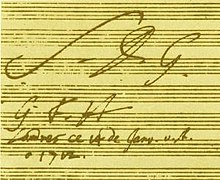I don't know whether you agree with Gardiner or not. Perhaps you are not even sure who those names refer to or what kind of music they may have composed. But his words tell us something of the purpose and power of music. It is not simply music to move the soul or appeal to personal taste or entertain or provide background noise. It is to give us the voice of God. How easy it is to forget this.
We live in an age in which music has become personalized. We all have our own playlists and favorites. We listen in the ear buds while the world around us is silenced. We use music to calm our nerves or comfort our anxieties or pump us up. But God's great gift is the music that accompanies the Word of God into our ears, minds, and hearts. That is music's ultimate purpose. It is not selfish for us but selfish for God's purpose and design.
 How easy it is to presume that music was created and given to us merely for our pleasure or enjoyment. What a shame that we are so self-centered to believe that any of God's gifts were merely tools for our own pursuit. Music was given to be a servant of the Word, at least according to Luther. But Luther did not stumble upon this. He, unlike others of the Great Reformation, saw that music was always connected to the people of God, to their lives of prayer and worship, and to the way they heard the Word and it was written into their minds as well as their hearts. As Augustine once so famously said (or is presumed to have said), He who sings prays twice!
How easy it is to presume that music was created and given to us merely for our pleasure or enjoyment. What a shame that we are so self-centered to believe that any of God's gifts were merely tools for our own pursuit. Music was given to be a servant of the Word, at least according to Luther. But Luther did not stumble upon this. He, unlike others of the Great Reformation, saw that music was always connected to the people of God, to their lives of prayer and worship, and to the way they heard the Word and it was written into their minds as well as their hearts. As Augustine once so famously said (or is presumed to have said), He who sings prays twice!Gardiner is spot on in seeing that the epitome of this was the life and work of Johann Sebastian Bach. Schooled in the Lutheran doctrine and faith from childhood, he lived in the Word and the Word lived in him and through him in a body of work unparalleled by any other composer. Mozart could captive God's laughter but Bach was able to capture the nobility of His love poured out for us in Christ not as sentiment but as profound gift and blessing.
3 comments:
Bach gave us God's word, Mozart gave us God's laughter, and Beethoven gave us God's fire.--Anonymous
All three of these uplifted the senses to the heavenly and made wonderful God's emptying of Himself. Just listen to Mozart's Et incarnatus est from the Great Mass in C minor for evidence of the latter. To pit one over the other just because Bach was Lutheran really shows an ignorance if aesthetics across the plane.
@Unknown...you missed the point, of course. J. S. Bach was a son of his church and was in service to the Church his whole life long. He was not a Romantic Deist type like Beethoven. He was not a Cretin of a human being as was Mozart.
If you do not at least understand the Church for which he provided music throughout his life, and its theology, you will never fully understand J. S. Bach.
Cheers.
Unknown2
I know music better than you do, Anonymous. And if you're getting your knowledge of Mozart from that movie, Amadeus, you've just proven how idiotic you are. Same for Beethoven. If you think you know Beethoven based on Immortal Beloved, then you obviously don't know how to read. I did not know MOzart or Beethoven personally but I know them from their music. Same with Bach. Most of Bach's letters were addressed to people who owed him money so again we, too, judge him by his music. I cannot believe that men who wrote some of the most devoutly religious music of all time are anything as you frame them.
Post a Comment